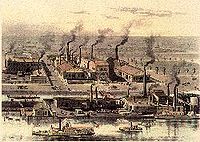
Balbach Smelting & Refining Company
Encyclopedia

Newark, New Jersey
Newark is the largest city in the American state of New Jersey, and the seat of Essex County. As of the 2010 United States Census, Newark had a population of 277,140, maintaining its status as the largest municipality in New Jersey. It is the 68th largest city in the U.S...
operating in the late 19th and early 20th centuries. It was the first commercial electrolytic refinery in the United States., and until its closure in the 1920s, it was the second largest metal processing enterprise in the United States.
History
The company president was Edward Balbach Jr. a metallurgist born in 1839 in KarlsruheKarlsruhe
The City of Karlsruhe is a city in the southwest of Germany, in the state of Baden-Württemberg, located near the French-German border.Karlsruhe was founded in 1715 as Karlsruhe Palace, when Germany was a series of principalities and city states...
, Baden, Germany. He came to the United States in 1848 with his father Edward Balbach Sr. (1804–1890) who started the Balbach family fortune by collecting gold and silver dust from Newark jewelry shop floors, turning it into bullion. In 1865 Edward Balbach, Jr. patented the "Balbach Process" which more efficiently separated gold and silver from lead, which later evolved into the Parkes process
Parkes process
The Parkes process is a pyrometallurgical industrial process for removing silver from lead, during the production of bullion. It is an example of liquid-liquid extraction....
. In 1881, the Balbachs began to manufacture copper, just in time for a boom in demand thanks to the inventions of the telegraph and telephone. In 1883 the factory opened an electrolytic refinery for copper, the first electrolytic refinery in the United States. In December 1910 Edward Balbach, Jr. died at the age of 72, control of the company passed to his daughter Julia's husband Edward Randolph (1870–1919) who had been working there since 1898. In 1919 Edward Randolph died and in the 1920s the Balbach operation was closed by its directors in favor of facilities closer to where the ore was dug up. The County purchased the factory and converted it to a baseball field, located at Riverbank Park
Riverbank Park
Riverbank Park, is located in Newark, New Jersey. The park was opened in 1907 and was added to the National Register of Historic Places on April 16, 1998...
.
Factory conditions were difficult. In the 1880s, workers earned $1.50 to $1.65 a day. It could also be dangerous, if water got into a boiler it turned to steam and could sometimes cause an explosion, spraying molten metal onto workers who, if not imobolized, were known to run into the Passaic River
Passaic River
The Passaic River is a mature surface river, approximately 80 mi long, in northern New Jersey in the United States. The river in its upper course flows in a highly circuitous route, meandering through the swamp lowlands between the ridge hills of rural and suburban northern New Jersey,...
. The accidents were not limited to workers - in January 1881 a boiler exploded causing a flying brick to strike a sleeping guest in the head through a third floor window at the nearby Balbach family mansion.

